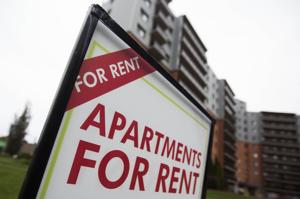Top Stories
Urgent Report: 28% of Canada’s Homeless Faced Eviction

UPDATE: A shocking new report reveals that nearly 28% of Canadians who have experienced homelessness were evicted at some point in their lives. This alarming statistic comes from the Canada Mortgage and Housing Corporation (CMHC) and emphasizes the urgent need for action as eviction rates rise across the country.
As part of a three-part series on evictions, CMHC’s findings show that while only 7% of the general population has experienced eviction, the rates are significantly higher among vulnerable groups. The report highlights a disturbing trend: Black renters make up 25% of evictions among racialized individuals, despite being only 15% of the racialized population. This underscores critical issues of racial inequality and systemic barriers within housing.
Aled ab Iorwerth, CMHC’s deputy chief economist, stated that the studies were initiated due to growing concerns about eviction in Canada. “We were not sure there had been enough analysis on it in Canada,” he explained. “We were also unsure about the state of the data, so what we tried to do was get up to speed and understand what the basic facts and implications are.”
The report also reveals that approximately 19% of households that reported being evicted in 2021 experienced what is termed “hidden homelessness,” meaning they stayed with friends or family. Additionally, a small percentage experienced “absolute homelessness,” living in shelters or outdoors. Notably, those who faced eviction are at a heightened risk of deteriorating mental and physical health.
The study emphasizes that although most people who face eviction do not become homeless, eviction significantly increases the risk for some. Notably, individuals with disabilities are more likely to experience homelessness after eviction.
In Ontario, the situation is even more dire, with immigrants facing higher eviction rates than non-immigrants. Among those who experienced eviction, 46% lived in Ontario, compared to 38% of Canadian-born individuals. Indigenous people were also disproportionately affected, representing 6% of evictions despite only making up 4% of all renters.
The impact of gender and family structure is also evident. Women often face financial difficulties post-separation, and domestic violence has been directly linked to eviction. Families with young children are particularly vulnerable, suggesting that the need for targeted support is critical.
The third report in the series highlights the intersection of health and housing. It reveals that individuals with pre-existing health conditions face a greater risk of eviction, and the act of eviction can exacerbate these health issues. The likelihood of eviction more than doubled for those reporting a higher degree of disability.
Furthermore, individuals with mental health or substance use issues and older adults are identified as high-risk groups for eviction. The report stresses that health conditions can impair a tenant’s ability to manage rent and maintain their homes, leading to a vicious cycle of eviction and declining health.
“Health supports are an important part of eviction prevention,” the report states, calling for enhanced resources and services to assist tenants before, during, and after eviction. This includes connecting individuals with necessary support systems and designing housing policies that meet tenants’ complex needs.
As Canada grapples with these pressing issues, the findings of this report serve as a clarion call for policymakers, social workers, and community organizations to prioritize eviction prevention strategies and support vulnerable populations. With eviction rates climbing, immediate action is essential to address this crisis and protect the most at-risk individuals in society.
-

 World4 months ago
World4 months agoScientists Unearth Ancient Antarctic Ice to Unlock Climate Secrets
-

 Entertainment4 months ago
Entertainment4 months agoTrump and McCormick to Announce $70 Billion Energy Investments
-

 Lifestyle4 months ago
Lifestyle4 months agoTransLink Launches Food Truck Program to Boost Revenue in Vancouver
-

 Science4 months ago
Science4 months agoFour Astronauts Return to Earth After International Space Station Mission
-

 Technology2 months ago
Technology2 months agoApple Notes Enhances Functionality with Markdown Support in macOS 26
-

 Top Stories3 weeks ago
Top Stories3 weeks agoUrgent Update: Fatal Crash on Highway 99 Claims Life of Pitt Meadows Man
-

 Sports4 months ago
Sports4 months agoSearch Underway for Missing Hunter Amid Hokkaido Bear Emergency
-

 Politics3 months ago
Politics3 months agoUkrainian Tennis Star Elina Svitolina Faces Death Threats Online
-

 Politics4 months ago
Politics4 months agoCarney Engages First Nations Leaders at Development Law Summit
-

 Technology4 months ago
Technology4 months agoFrosthaven Launches Early Access on July 31, 2025
-

 Top Stories2 weeks ago
Top Stories2 weeks agoFamily Remembers Beverley Rowbotham 25 Years After Murder
-

 Top Stories4 days ago
Top Stories4 days agoBlake Snell’s Frustration Ignites Toronto Blue Jays Fan Fury





















